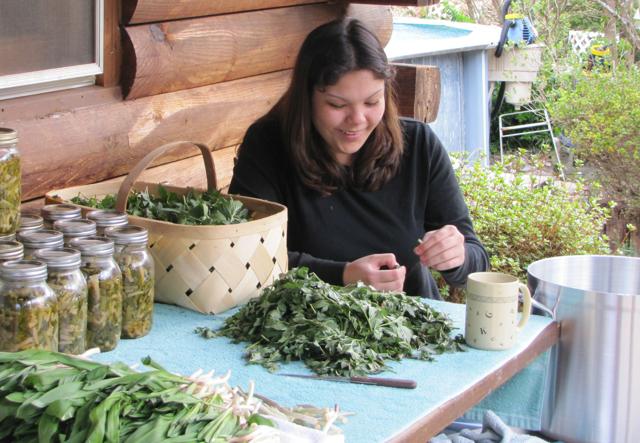In Western North Carolina, both the language and activity of farming are changing dramatically, expanding to include such intriguing terms as “slow native foods” and “forest farming.” Farmers, perhaps the most adaptable group of people on the planet, are starting to look to crops that don’t require neat rows in brightly sunlit fields. In the process, some are returning to the forests — and making a profit doing so. In the tradition of small Appalachian farms, these forward-looking producers are diversifying and making use of forested land in an effort to boost overall profits.
But forest farming isn’t just about harvesting plants (such as ginseng) that are already growing in our mountains, explains Caroline Edwards of the Western North Carolina Forest Products Cooperative Marketing Project. It also involves managing any crop that requires a more shaded, moist environment. Farmers throughout the region are now raising specialty items such as shiitake mushrooms, a non-native crop that grows on logs. Funded by federal stimulus dollars funneled through the Land-of-Sky Regional Council, the project is helping 14 competitively selected WNC businesses produce and market new crops while creating local jobs.
The North Carolina Mountain Mushroom Cooperative, for example, is educating farmers and home gardeners alike about how to use their forested land to produce this valuable crop. Often called the meat of the vegetable world because of their relatively high protein content, mushrooms are an amazingly healthy and popular food. Loaded with B vitamins, potassium, vitamin C and essential minerals, they’re much in demand among local grocers and restaurants. In fact, the cooperative is now looking to larger cities such as Charlotte to expand the market for WNC’s mushroom harvest.
These growers are specifically focusing on the oyster mushroom, which needs nothing more than a substrate of some sort (Edwards suggests chopped-up kudzu) to grow on. Keeping the mushrooms moist is critical, and hand-picking regularly is important. Mushrooms, says Edwards, can be a year-round crop if a farmer wants to manage them as such; otherwise they’re harvested twice a year, in spring and fall.
In addition to foods such as mushrooms, nuts and ramps, forest products include herbs, medicinal plants and decoratives (used in floral arrangements and to produce dyes).
Another idea that’s gaining traction is a focus on slow native foods (as opposed to the fast, non-native foods so many of us depend on). For farmers, raising native species just makes sense: Acclimated to local conditions, they’re less susceptible to frost, disease and pests, thus reducing overhead.
Recovering Traditional Cherokee Delicacies, another WNC Forest Products partner, aims to “train and employ unemployed forest producers to harvest, grow and market forest food products traditionally gathered by the Cherokee, such as wild edible greens and mushrooms,” according to the group’s grant proposal. Mary Thompson is leading the way in educating the next generation about growing, harvesting and storing native foods. She’s raising ramps and sochan (two traditional Cherokee foods) as well as watercress, native mushrooms and crawfish (a freshwater crustacean that’s similar to shrimp).
Working with Edwards, Thompson hopes to restore ramp populations decimated by overharvesting. For Thompson, the project means honoring her Cherokee heritage while preserving foods she loves; meanwhile, the idea of propagating native foods is catching on.
Yet another project partner, the Smoky Mountain Native Plants Association, is conducting research “to ensure an ongoing harvest for future generations,” according to the Graham County group’s website. Using Stecoah Valley Food Ventures’ commercial kitchen in the Stecoah Valley Cultural Arts Center, group members process and package ramp products such as seasonings and breading. All proceeds support further research on the best ways to propagate, cultivate and sustainably harvest mountain ramps and other native plants.
Traditionally considered a spring tonic, ramps should be harvested by cutting the bulb one inch above the roots, leaving the rest as a foundation for next year’s crop, Edwards explains.
Ultimately, forest farming incorporates many concepts: using all types of land to support profitable, sustainable farming while conserving our native wild foods. It’s an idea whose time has come.
To learn more about the Western North Carolina Forest Products Cooperative Marketing Project, visit wncforestproducts.wordpress.com or call Erica Anderson at 828-251-6622, ext. 141.
— Cinthia Milner gardens in Leicester.



Before you comment
The comments section is here to provide a platform for civil dialogue on the issues we face together as a local community. Xpress is committed to offering this platform for all voices, but when the tone of the discussion gets nasty or strays off topic, we believe many people choose not to participate. Xpress editors are determined to moderate comments to ensure a constructive interchange is maintained. All comments judged not to be in keeping with the spirit of civil discourse will be removed and repeat violators will be banned. See here for our terms of service. Thank you for being part of this effort to promote respectful discussion.